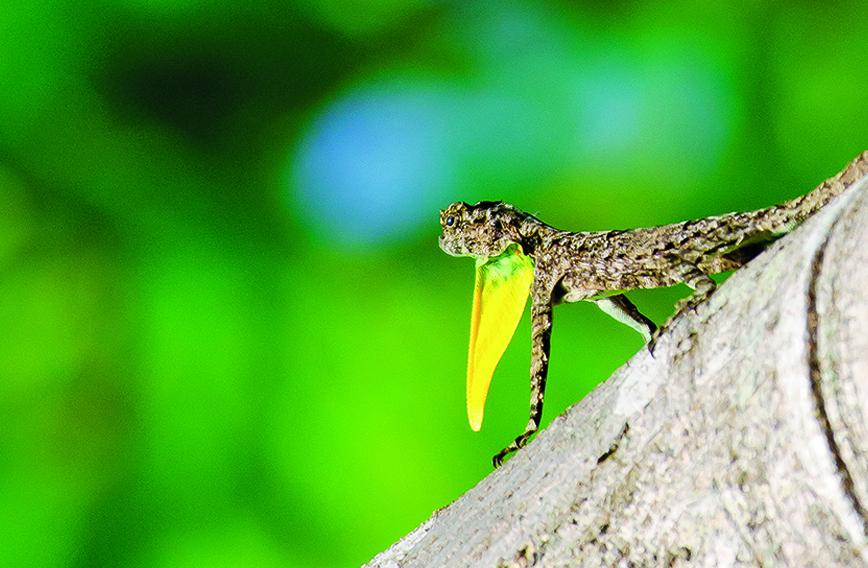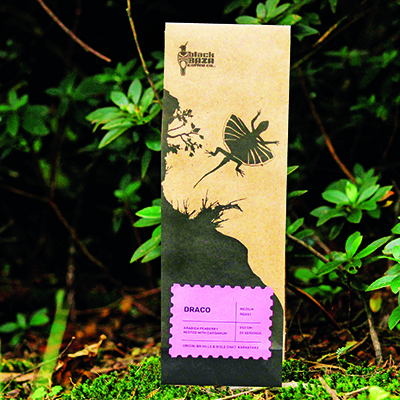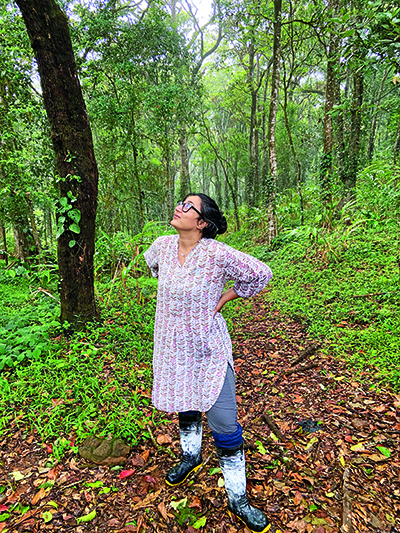
The Draco, poised for flight. It is like a mini dragon
Good coffee, wondrous forest
Civil Society Reviews
Reptiles, animals in coffee, do we hear you ask in amazement? Yes, yes, up in the steamy and teeming forests of the Western Ghats all living forms are part of a collaborative effort. These mountain ranges are bursting with biodiversity. They are a rare boon to the planet.
Take, for example, the Draco, a gliding lizard with a yellow dewlap. Membranes in its forelegs and hindlegs expand to serve as wings when it needs to escape a predator or if it feels the urge to just shift location a bit from one tree’s bark to another. A Draco flies like a mini dragon.
The Draco’s world is the forest. You won’t find it in your neighbourhood park. So, don’t even think of bringing it home. And if you happen to see forests vanishing, remember the Draco will be vanishing, too.
It is a coffee named Draco which we are trying out in this magazine. It comes from the Black Baza Coffee Company whose repertoire of products is finely honed by the perfections it discovers in the wilds of the Western Ghats.
“We have been inspired by the Draco’s evolutionary flight. How did it feel to sit on a rock for two straight hours despite leeches, and watch this fantastical creature flick its yellow dewlap before it took off from the truck of one tree and glided to another? Well, it inspired a coffee, a more modest evolutionary flight but an intelligent adaptation nonetheless!” says Black Baza’s ebullient founder, Arshiya Bose.
“Inspired by the setting in which we first saw the Draco, we created a brew where Arabica from the BR Hills exists in quantum entanglement with green cardamom from Attihally. This is a delicate coffee deliberately,” she says.
If you are the instant coffee drinking type, shoving spoonfuls of powder into cups of hot water, you are clearly missing out on the exciting action. Instant is just not the real thing. The caffeine may be the stimulation you need but you aren’t among the woke coffee-drinkers of the world.
Good coffee equals good forests and vice versa. Forget what comes from company-owned plantations. That is the kind of mass-produced stuff corporate profits are generated from. Think instead of those small farmers on homesteads and their coffee plants entwined with cardamom and pepper and nourished by life forms you can’t imagine.
When this magazine was in Coorg not too long ago, we spent a brilliant night watching rare frogs twinkling in the dark. It was surreal. What we were witnessing was really just one scene in a much bigger performance. This was also the time when frogs would be born on trees, encased in leaves which would open to let the babies fall into water bodies to become tadpoles. Snakes from all over would congregate at the water bodies to make a meal of the frogs.
 In the Western Ghats in Maharashtra, Archana Godbole, a botanist on a mission to document and save biodiversity, would walk us through sacred groves and private forests where communities over generations had built up storehouses of gene wealth. Cobras would be gently shooed away. The great Indian hornbill, nesting in the hollows of trees, was the dependable carrier of seeds. Scorpions were a part of life. It is here that the unique Alphonso mango flourishes.
In the Western Ghats in Maharashtra, Archana Godbole, a botanist on a mission to document and save biodiversity, would walk us through sacred groves and private forests where communities over generations had built up storehouses of gene wealth. Cobras would be gently shooed away. The great Indian hornbill, nesting in the hollows of trees, was the dependable carrier of seeds. Scorpions were a part of life. It is here that the unique Alphonso mango flourishes.
Dark clouds now hover over these idyllic arrangements. They have always been under some kind of stress. A sacred grove vanishing here, a private forest getting chopped down there to sell off the timber for some quick money.
But now the threat is more serious. A recent amendment to the Forest Conservation Act (FCA) of 1980 says there will be no protection to forest cover unless it is recognized as being forest by the government.
The amendment relates to border tracts so as to facilitate the construction of strategic infrastructure. Security is important but in the fragile Himalayas such construction, even if needed, could have its own problems. In the Western Ghats, if the new law is applied, it could throw small farmers with family holdings into turmoil. Many of their lands are under the 1980 act deemed to be forests even though they don't figures in government records as forests. They grow excellent coffee, premium pepper and cardamom and more. But now with the amendment cutting through them with some six-lane highway would be possible.Livelihoods and nature's bounty would be lost.
“Vast acres of forested land, scrub jungle, grasslands, high-altitude deserts and alpine forest exist beyond government records and these areas are likely to lose legal protection,” explains Bose.
“In coffee landscapes, for example, sacred groves and community forests are maintained by villages but are not recognized as ‘forest’ in government records. While the FCA requires a rigorous process of obtaining clearance before such forests and ecosystems are diverted for non-forest use, the amendment would fast-track this diversion...and local communities, our partner producers, would have little legal backing to resist,” she fears.
“Fast track for whom? Enter the builders of six-lane highways and miners of bauxite, makers of dams and rollers of steel,” Bose reiterates.
Black Baza has been working with small growers and community groups, assisting them in using their eco-friendly traditional practices to carve out a niche for themselves in markets where consumer preferences have not just veered away from chemicals but are also conscious of fair trade terms and promotion of small producers.
The small company’s slogan is that it produces “diversity friendly coffee”. While doing so it protects the balance in nature and simultaneously takes farmers to markets and helps them compete with good branding and penetration.
 |
|
Arshiya Bose in the wilds Draco-watching |
Bose was researching sustainability certifications in coffee when she was approached by coffee growers of the Kodagu region to help them better market their produce. She has a PhD on the political ecology of markets for biodiversity conservation from Cambridge University.
The coffee business is infamous for its inequalities. The grower gets just 2.8 percent of the retail price. As Bose morphed into an ethical entrepreneur, setting up Black Baza, growers began getting 17 percent from the company.
It is not just the money. It is also the building of identity. The communities come to be known for what they grow. And it doesn’t happen in a shrill, evangelical way. Black Baza is great with its appeal to consumers, its packaging and its online presence where it is not just about transactions but immersion in the world of small coffee growers.
When the customer buys the coffee they sign up to be part of a transformational experience. The messaging is great: “Your cup of coffee is kinder to the environment and the grower.” Of course the coffee is good, but you also “secure livelihoods and strengthen coffee farming practices that conserve biodiversity. We invite you to participate in the process. This is a great step one. But we can do more”.
Bose stresses that it was the farmers who came to her. They were growing coffee under trees as it should be grown while in other parts of the world plantations had replaced such practices.
Extending herself beyond her academic interests, Bose set up Black Baza in 2016 as an “activist company”. It remains a private entity and a business. But like many small, modern Indian businesses it has a mission and strong ethical foundations.
At last count, there were 650 producers she was working with. They come from tribal and marginalized communities who get left behind in the stampede for market share. Getting them a better deal is both a business and a social goal. It puts much more than caffeine into a cup of coffee for the urban consumer.
Comments
Currently there are no Comments. Be first to write a comment!




